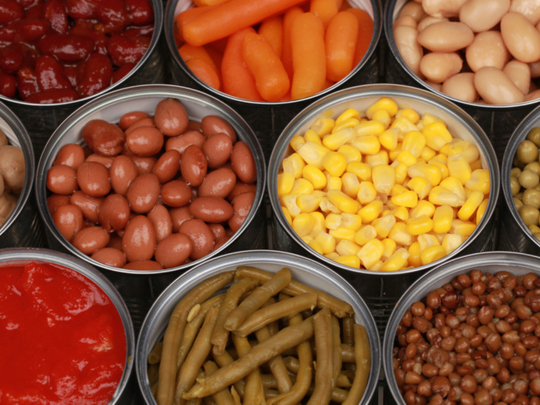
Dubai: A government laboratory on Tuesday cautioned residents against incorrect storage and consumption practices of canned food that can cause health issues.
The warning came from a team of experts who studied the presence of tin leaking into the food content in canned foods.
The study was conducted by four experts – Iftekhar Ahmad Mohammad, Libin Antony Johnson, Baheiya Mohammad and Mohammad Aleem Al Deen of the Food Chemical Analysis Unit of Dubai Central Laboratory (DCL) under Dubai Municipality.
The study was presented at the 11th Dubai International Food Safety Conference that concluded on Tuesday.
Iftekhar Ahmad Mohammad, principal food chemical analyst, said the study was conducted because a significant quantity of food and beverages arrive in the market with tinplate packaging.
“If it is stored for a long time, tin dissolves and migrates to the food. It can cause diarrhoea and other gastrointestinal illnesses,” he told Gulf News during the poster presentation of the study.
The ingestion of accumulated trace metals from canned food also poses health hazard such as skin irritation, damage to the liver, kidney, circulatory and nerve tissues, resulting from acute or chronic exposure.
A total of 250 samples of different kinds of canned foods (pineapple, beans, vegetables, mushrooms, tomatoes, fruit syrup, fruit cocktails, beef, tuna, sardines and olives) were collected from several supermarkets and local retail outlets in Dubai for the study.
Tin concentration was not detected in some canned foods like olives, sardines, beef and tuna.
However, tin present in the can had leached into canned fruit syrups, fruit cocktails, mushrooms, tomatoes and pineapple.
Acidic content
Though their samples contained less than the permissible limit of 200ppm of tin, its presence was found to be more when the acidic content of food items inside the cans is more, like in the case of tomatoes and fruits.
“Though they were within the safe limits, I feel continuous consumption of such canned food items may not be good for at least some people with less tolerance level.”
Also, when the cans were opened and allowed to stand, the dissolving of tin from the can surface into syrup was enhanced. The tin concentrations then spiked up to more than 200ppm.
Iftekhar said the results suggest that consumers should immediately pour the contents out of tin can into a glass vessel after a can is opened.
“It is also not advisable to consume only a portion of such food and leave the rest in the can either in the fridge or outside.”
He also had a word of caution against consuming the water in which these canned food items are preserved.
“Most of the migrant content [of tin] will be in the water with preservatives. So, it is not advisable to consume it.”
“Many people here depend on canned food for convenience and to save time. So, I feel people should take care of these things to increase safety and quality of canned food.”
He said the researchers will recommend reducing the shelf life of tins and frequent tests to monitor the safety of such canned food items.
“For can manufacturers, there is still room for improving the treatment of the can surface to reduce the dissolving of tin,” said Iftekhar.












